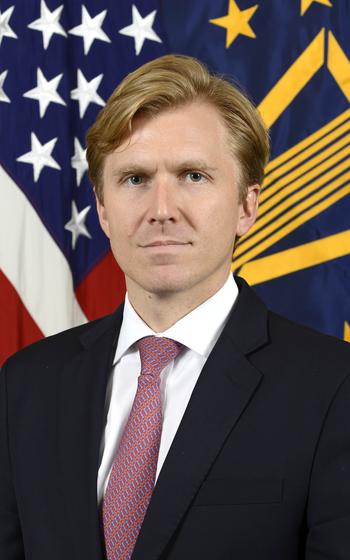
The Nimitz-class aircraft carrier USS Carl Vinson sails in formation with the Arleigh Burke-class guided-missile destroyer USS Sterett alongside the Philippine navy while transiting the South China Sea on Jan. 17, 2025. Two top-level officials who joined the Defense Department this week are known for their hawkish views on China and have pushed for a major U.S. military realignment toward the Indo-Pacific. (Brianna Walker/U.S. Navy)
President Donald Trump’s team of defense advisers is taking shape, this week adding two high-level officials who have called for slashing the American armed presence in Europe and broadly restructuring the military to deal with China.
Austin Dahmer and Alexander Velez-Green, known for their hawkish views on China, will serve in senior posts focused on developing military strategy, the Defense Department said Tuesday.
Both have close ties to Elbridge Colby, the nominee for undersecretary of defense for policy. If he’s confirmed, Colby and company will be the Pentagon’s primary strategists with a big say on how U.S. troops are deployed around the world.

Elbridge Colby is President Donald Trump's pick for undersecretary of defense for policy. A 2021 book by Colby lent its title to the U.S. military strategy outlined by Austin Dahmer, who joined the Defense Department this week in a key strategist role. (Monica King/Department of Defense)
And a 2023 research report by Dahmer for the Marathon Initiative, a Washington think tank co-founded by Colby, gives granular insight into what is dubbed a “strategy of denial” in the Pacific, after the title of a 2021 book by Colby.
The approach aims to deter adversaries from acting aggressively by convincing them “that they would fail to realize their objectives if they attempted such behavior,” according to the report.
Meeting such requirements in the Pacific entails accepting more risks in other regions in lieu of major defense spending increases, wrote Dahmer, now the Pentagon’s deputy assistant secretary of defense for strategy.
In the report, Dahmer does not take a position on how big the DOD budget should be. But without a big boost in expenditures, he wrote, the Pentagon would need to search for savings or “bill payers” to surge capabilities required to deter potential Chinese aggression against Taiwan, Okinawa or the Philippines.
“One of the largest bill payers in resourcing the strategy of denial should be the Army,” the report said.
The strategy targets both the Army’s active-duty cohort and the National Guard and calls for deactivation of four Stryker brigades, six infantry brigades and two aviation brigades.
Also headed to the chopping block would be a number of Army ground vehicle and aviation modernization and procurement programs, and all the Air Force’s A-10C aircraft would be retired, according to the report’s recommendations.
Drastic reductions would also be made in the DOD civilian workforce under Dahmer’s prescriptions. For the Army to avoid big cuts while still meeting Pentagon objectives in the Pacific, DOD would need a roughly 10% annual budget increase, the report said.

A U.S. Army M1A2 Abrams tank simulates firing at Bemowo Piskie Training Area, Poland, on Nov. 13, 2024. In a 2023 report, a newly installed top Defense Department official called for a major realignment of Army personnel and a cut of $70 billion from the service's budget. (Trevor Wilson/U.S. Army)
Overall, Dahmer’s report recommends about $70 billion less annually for the Army, which along with other cuts would give about $40 billion more apiece to the Navy and Air Force.
The realignment he calls for in the report would also exact a heavy toll on the security structures that Europe has been relying on for over a decade. For one thing, the U.S. European Command mission would be slashed.
The European Deterrence Initiative, a multibillion-dollar annual effort aimed at deterring Russian aggression, would be dramatically scaled back if not eliminated outright, according to the report.
That would mean the end of Army tank brigade rotations to Europe that have been a staple of the EUCOM mission since Russia’s initial invasion of Ukraine in 2014 and that have grown since Moscow’s full-scale invasion in 2022.
Dahmer’s report says savings from cuts to the Army, EUCOM mission and DOD civilian workforce would enable a faster buildup of production on a wide range of munitions needed in East Asia.
In-demand assets in the Pacific will involve most of the military’s major systems, ranging from the Army artillery units and Patriot batteries to Navy warships, submarines and long-range Air Force bombers, the report said.
Velez-Green, who now serves as the senior adviser to the undersecretary of defense for policy, told Stars and Stripes last year that requirements in the Pacific mean European allies will need to shoulder a much larger share of the security burden on the Continent.
“These (EUCOM troops) are the forces that cannot be in two places at once. They’ll have to be backfilled by our NATO allies,” Velez-Green said in May.
He and Colby argued that the Pentagon has stretched itself too thin and that stakes in the Pacific are too high to overinvest elsewhere.
Velez-Green formerly worked as a senior policy adviser at the Heritage Foundation, the conservative think tank behind the controversial Project 2025 set of initiatives.